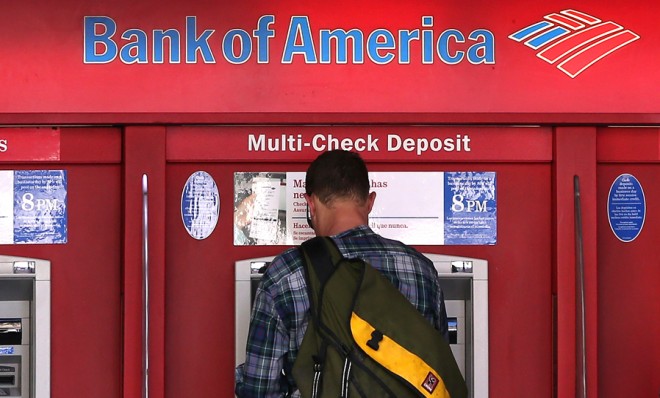Is it last call for record bank earnings?
Three factors that could eat away at Wall Street's soaring profits

Thanks mostly to a booming stock market and healthy levels of lending, the U.S.'s five biggest banks are so far having a hell of a year. Bank of America's second quarter profits rose 70 percent from the same quarter in 2012 to $3.6 billion, JPMorgan Chase's haul grew 31 percent to a sweet $6.1 billion, and Goldman Sachs' earnings doubled to $1.9 billion.
But analysts predict that certain factors looming in the distance could spell the end of skyrocketing profits for big banks.
Here, three threats:
The Week
Escape your echo chamber. Get the facts behind the news, plus analysis from multiple perspectives.

Sign up for The Week's Free Newsletters
From our morning news briefing to a weekly Good News Newsletter, get the best of The Week delivered directly to your inbox.
From our morning news briefing to a weekly Good News Newsletter, get the best of The Week delivered directly to your inbox.
1. Regulation
Along with the implementation of the U.S. regulatory overhaul known as the Dodd-Frank Act, Wall Street will face new restrictions under Basel III, a global regulatory standard that is scheduled to be introduced between 2013 and 2015. Basel III requires banks to hold more funds in reserve to better absorb losses in the event of a crisis.
Furthermore, Sens. Elizabeth Warren (Mass.) and John McCain (Ariz.) are shopping around a new proposal to effectively restore the Glass-Steagall Act, which prohibited traditional consumer banks from engaging in investment banking.
Predictably, Wall Street's titans are sputtering in protest. Here's what JPMorgan CEO Jamie Dimon told CNBC:
A free daily email with the biggest news stories of the day – and the best features from TheWeek.com
"If you have a world where some businesses have to have twice as much capital as other companies, that over time can create huge competitive disadvantages. I don't know of any industry in America who would want to compete globally on that basis. We have an interest in a safe and sound system so we're not against a leverage ratio but we would be — we're not for a largely unbalanced competitive playing field. So put aside, that regulators know that. They're trying to — we thought that the point of Basel and all that is to harmonize these kind of things." [CNBC]
However, many fear that the new capital requirements still won't be enough to withstand another breakdown. Clive Crook at Bloomberg writes:
Bear in mind that, historically, banks judged it necessary to finance as much as 25 percent of their lending with equity. Research suggests that a leverage ratio of 10 percent is the plausible safe minimum. U.S. banks are making big profits again, and could use them to keep adding to capital. The prospect of a 6 percent leverage ratio hasn’t hurt their value in the market. We should be discussing a doubling of that number — but we aren’t. [Bloomberg]
2. Bonds
Trouble in the bond market could also cut into banks' profits. The Federal Reserve remains coy about when it will start phasing out its bond-buying stimulus program, and the prevailing uncertainty has caused interest rates to edge up. Credit is the lifeblood of the financial industry, and mega-banks have relied heavily on the super-low interest rates of recent years to reap profits on an array of transactions.
"With the rise in interest rates, the tailwind for banks from the refinancing boom may soon fade," Bank of America Merrill Lynch analysts told CNBC.
3. Emerging markets
Growth in China, which has been the primary engine of the global economy for years, continues to slow, which has made it riskier to invest in emerging markets as a whole.
China's neighbors in Asia are highly dependent on the region's powerhouse for growth. Furthermore, emerging economies as far-flung as Latin America could also suffer, given that they sell the bulk of their resources to China.
All of which spells trouble for multinational banks that have spread their tentacles to emerging markets while the economies of the U.S. and Europe continue to struggle.
Citigroup, which earned more than 40 percent of its revenue for the first half of the year from developing nations, is particularly susceptible as outlooks for those economies weaken.
"If anything goes bump in the world, Citigroup may well have some exposure," Fred Cannon, an analyst at Keefe, Bruyette & Woods, told Reuters.
Carmel Lobello is the business editor at TheWeek.com. Previously, she was an editor at DeathandTaxesMag.com.
-
 What would a credit card rate cap mean for you?
What would a credit card rate cap mean for you?the explainer President Donald Trump has floated the possibility of a one-year rate cap
-
 Is the American era officially over?
Is the American era officially over?Talking Points Trump’s trade wars and Greenland push are alienating old allies
-
 Political cartoons for January 26
Political cartoons for January 26Cartoons Monday's political cartoons include an ICE storm, the TikTok takeover, and Iranian-style reform